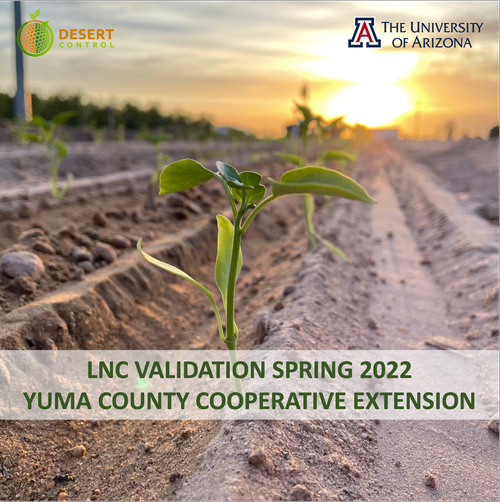Desert Control announces deployment of the first LNC treatment for American soil
Norwegian AgTech company Desert Control has developed a liquid natural clay (LNC) that restores soil and reduces water usage for agriculture and green landscapes. Validation of LNC by independent research institutions started in the United Arab Emirates in 2019. The company is now entering the commercial stage in the Middle East and launching validation initiatives and pilots in the United States.
Yuma, Arizona, 23 March 2022 – Desert Control AS (DSRT) announce deployment of the first LNC treatment for American soil in a validation study with the University of Arizona.
Desert Control entered into an agreement with the University of Arizona and its Yuma County Cooperative Extension for the first validation study of LNC for American soil. The study will focus on LNC’s ability to increase water holding capacity for sandy soils and consider the transferability of results achieved in the UAE.
The Yuma County Cooperative Extension’s mission is to engage with people through applied research and education to improve lives, families, communities, the environment, and economies in Arizona and beyond. The University of Arizona and its extension service have been assisting farmers, ranchers, agency personnel, and others involved in agricultural innovation and natural resource management for over 100 years to responsibly increase profits and steward our natural resources.
Planning and preparations for the validation study started late last year, targeting spring planting crops such as watermelons and bell peppers. The season for planting these crops began mid-March this year. The team arrived in Yuma on 10 March after successfully commissioning the first U.S. mobile LNC production unit. The 1-acre plot for the validation study has since been transformed from a barren desert state to cultivated land.

Innovations that improve soil health, reduce water and fertilizer usage, and increase crop uniformity will bring significant value to farmers and landowners in the US Desert Southwest, says Robert Masson, Assistant Ag Extension Agent for Yuma County Cooperative Extension. We look forward to validating the potential impact LNC may have on improving sandy soils and turning marginal ground into arable farmland.
Assessing the potential of innovations is integral to our vision of being a vital national leader in creating and applying knowledge to help people build thriving, sustainable lives, communities, and economies.
The first harvest of bell peppers in Yuma is expected to start in late May to early June, and watermelons at the end of June. The validation study with the University of Arizona for LNC is part of a multi-year program. Reports and publications will be shared as they become available during the advance of the program. The Yuma County Cooperative Extension hosts guided field visits for farmers and growers on request.
Desert Control applies a science-led and field-proven approach to innovation. Independent research institutions and universities play a vital part in this approach, says Ole Kristian Sivertsen, President and Group CEO of Desert Control. We are impressed by the expertise and experience of the Yuma County Cooperative Extension team. The impact of the University of Arizona will reach far beyond the United States. Together we aim to build bridges between the U.S. and the Middle East to advance climate-smart agriculture innovations.

